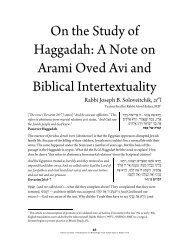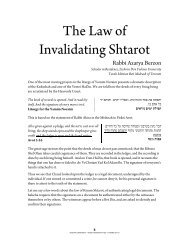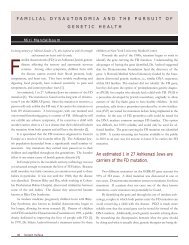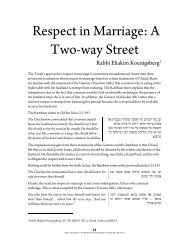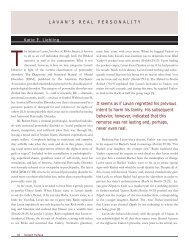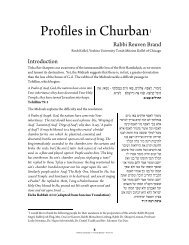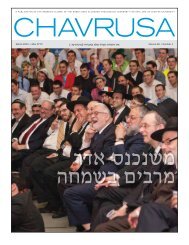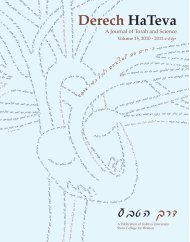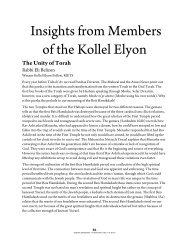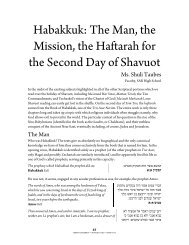YESHIVA UNIVERSITY • SUKKOT TO-GO ... - YU Torah Online
YESHIVA UNIVERSITY • SUKKOT TO-GO ... - YU Torah Online
YESHIVA UNIVERSITY • SUKKOT TO-GO ... - YU Torah Online
You also want an ePaper? Increase the reach of your titles
YUMPU automatically turns print PDFs into web optimized ePapers that Google loves.
Travelers on Succot<br />
Rabbi Azarya Berzon<br />
Scholar in Residence, Zichron Dov Yeshiva University<br />
Kollel Mitziyon Toronto Community Beit Midrash<br />
Is the traveler obligated in the mitzvah of Succah when he’s on the road? Must he find a Succah<br />
to eat and sleep in when he arrives at his temporary quarters for the night? If he cannot find a<br />
Succah must he build one? These questions are addressed by the Gemorah in Succah (26a). The<br />
Meiri quotes a dispute about the nature and scope of the exemption from Succah granted to<br />
travelers, and adopts the view that the traveler enjoys a far-reaching exemption despite the fact<br />
that he is not on his way to do a mitzvah. We will attempt to understand the opinion of the Meiri.<br />
We will begin by analyzing the nature of mitzvah obligations in general and the mitzvah of<br />
Succah in particular.<br />
Many mitzvot require an object and an action performed with that object. Such mitzvot entail a<br />
dual obligation. First, one must do whatever necessary to obtain the object, be it the etrog,<br />
shofar, matzah, etc.; second, one must implement the mitzvah act with the object.<br />
The question arises: are these two obligations equal in status, or is the obligation to perform the<br />
mitzvah-act primary, whereas the obligation to acquire the object is secondary? To formulate the<br />
problem in conceptual terms, is the obligation to obtain the object an essential part of the<br />
obligation to perform the mitzvah and hence of equal weight, or is the essence of the mitzvah the<br />
action itself and the obligation to obtain the object of lesser status? 1<br />
We can answer this question by investigating the halachot that apply to situations of exemption.<br />
In the domain of mitzvot in general, halacha operates with a variety of exemption rules. How do<br />
these exemptions apply to the two obligations described above? Do they apply in the same way<br />
to both obligations, or is there a difference between the two? 2<br />
1 The Tzlach (Psachim 3b) claims that one who is “far away” before the obligation of Korban Pesach arrives is not<br />
required to “come close” before the moment of obligation. The Minchat Chinuch (Mitzva #5) disagrees and claims<br />
that certainly one is required, even before the obligation of Korban Pesach arrives, to “come close” so that he be<br />
included in Korban Pesach. He writes, “Would anyone entertain the possibility that one need not acquire a lulav or a<br />
shofar before the holiday so that he can perform the mitzvah in its proper time?” It is possible that the Tzlach would<br />
concede that one is absolutely obligated to acquire a lulav in advance of the Chag as an essential ingredient of the<br />
mitzvah of lulav. However “kiruv makom” in the case of Korban Pesach is a condition that produces this mitzvah and<br />
one is not required to actively guarantee that the condition necessary to generate a mitzvah-obligation be fulfilled.<br />
However both the Tzlach and the Minchat Chinuch might agree that the obligation to obtain a lulav is secondary to<br />
the primary obligation of “netilat lulav”.<br />
2 I believe we can demonstrate the difference between the two obligations with the following example. Insofar as the<br />
first obligation often involves financial expenses [i.e. “chovat mamon”], whereas the second involves a physical act<br />
[i.e. “chovat ha’guf”], a poor person may, under certain circumstances, be exempt from obligation to purchase the<br />
object – i.e. a lulav - but if he has one, he is obligated to implement the mitzvah act of “netilat lulav”.<br />
10<br />
<strong>YESHIVA</strong> <strong>UNIVERSITY</strong> <strong>•</strong> <strong>SUKKOT</strong> <strong>TO</strong>-<strong>GO</strong> <strong>•</strong> TISHREI 5771



